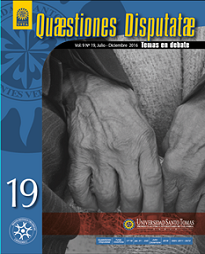Politics and participation: a project for peace with the early childhood
Main Article Content
Abstract
This article gives evidence to the need of denature of the idea of subordination of the child in the presence of adults. The idea is to relocate the childhood notion in a place where the capacity of the child to create symbols and generate culture can be recognized. This is seen in his preparation to be a citizen through an education which recognizes, value and respects him. This would emancipate him in the common construction of the shared society with adults. This article also conceives a child as a subject with rights, with the capacity of taking part in issues that affect him. In this way, the idea of participation as right- dutie is developed in every scene to favor the formation of politics, the integral human development and the search of the common well for peace. This becomes the origin of politics and peace to understand them, and see their real sense to contribute to the construction of social fabric.
Article Details
How to Cite
Ortiz -Díaz, L. D., & Zorro-Tamayo, A. J. (2016). Politics and participation: a project for peace with the early childhood. Quaestiones Disputatae: Temas En Debate, 9(19), 86-101. Retrieved from http://revistas.ustatunja.edu.co/index.php/qdisputatae/article/view/1111
Section
Artículos Núm. 19
De acuerdo a la Licencia Creative Commons Atribución-No Comercial-Sin Derivar 4.0 Internacional, se autoriza leer, descargar, copiar, distribuir, imprimir, buscar o enlazar los textos completos de estos artículos, siempre y cuando se conceda el crédito a los autores de los textos y a la Revista Quaestiones Disputatae: temas en debate, como fuente de publicación original. No se permite el uso comercial de copia o distribución de contenidos, así como tampoco la adaptación, derivación o transformación alguna de estos sin la autorización previa de los autores y de la dirección de Quaestiones Disputatae: temas en debate.

Esta obra está bajo una licencia de Creative Commons Reconocimiento-NoComercial-SinObraDerivada 4.0 Internacional.
References
Anillas, G., y Pauccar, N. (2004). Indicadores de participación en niños, niñas y adolescentes en proyectos. Lima, Perú: Escuela para el desarrollo.
Arendt, H. (1993). La condición humana. Barcelona, España: Paidós.
________. (1997). ¿Qué es la política?. Barcelona, España: Paidós.
Asamblea General de las Naciones Unidas. (20 de noviembre de 1989). Convención Internacional de los Derechos del Niño. Recuperado de http://www.unicef.org/argentina/spanish/7.-convencionsobrelosderechos.pdf
Baratta, A. (2007). La niñez como arqueología del futuro. Justicia y derechos del niño. UNICEF Fondo de las Naciones Unidas para la Infancia, (9), 7-15. Recuperado de http://www.unicef.org/argentina/spanish/Justcia_y_derechos_9.pdf
Constitución Política de Colombia [Const.] (1991). Asamblea Nacional Constituyente realizada el 6 de julio de 1991. Recuperado de http://www.unesco. org/culture/natlaws/media/pdf/colombia/colombia_constitucion_politica_1991spaorof.pdf
Langlois, D. (2004). La política explicada a los niños y a los demás. Quindío, Colombia: Universidad del Quindío.
Lederach, J. P. (2000). El abecé de la paz y los conflictos: educación para la paz. Madrid, España: Catarata.
Lévinas, E. (1993). El tiempo y el otro. Barcelona, España: Paidós.
López, G. (enero-febrero 2012). El derecho a la participación en la infancia. Revista Internacional Magisterio. Educación y Pedagogía, (54), 54-58.
Nussbaum, M. (2014). Emociones políticas: ¿por qué el amor es importante para la justicia? Bogotá, Colombia: Planeta Colombiana, S.A.
Santo Padre Francisco. (2013). Exhortación Apostólica “Evangelii Gaudium”. Roma, Italia: Librería Editrice Vaticana. Recuperado de https://books.google. com.co/books?id=rB4PCAAAQBAJ
______. (2015). Carta Encíclica “Laudato Sí”: Sobre el cuidado de la casa común. Roma, Italia: Tipografía Vaticana. Recuperado de http://w2.vatican.va/content/ dam/francesco/pdf/encyclicals/documents/papafrancesco_20150524_enciclica-laudato-si_sp.pdf
Tonucci, F. (1998). La ciudad de los niños. Madrid, España: Fundación Germán Sánchez Ruipérez.
Arendt, H. (1993). La condición humana. Barcelona, España: Paidós.
________. (1997). ¿Qué es la política?. Barcelona, España: Paidós.
Asamblea General de las Naciones Unidas. (20 de noviembre de 1989). Convención Internacional de los Derechos del Niño. Recuperado de http://www.unicef.org/argentina/spanish/7.-convencionsobrelosderechos.pdf
Baratta, A. (2007). La niñez como arqueología del futuro. Justicia y derechos del niño. UNICEF Fondo de las Naciones Unidas para la Infancia, (9), 7-15. Recuperado de http://www.unicef.org/argentina/spanish/Justcia_y_derechos_9.pdf
Constitución Política de Colombia [Const.] (1991). Asamblea Nacional Constituyente realizada el 6 de julio de 1991. Recuperado de http://www.unesco. org/culture/natlaws/media/pdf/colombia/colombia_constitucion_politica_1991spaorof.pdf
Langlois, D. (2004). La política explicada a los niños y a los demás. Quindío, Colombia: Universidad del Quindío.
Lederach, J. P. (2000). El abecé de la paz y los conflictos: educación para la paz. Madrid, España: Catarata.
Lévinas, E. (1993). El tiempo y el otro. Barcelona, España: Paidós.
López, G. (enero-febrero 2012). El derecho a la participación en la infancia. Revista Internacional Magisterio. Educación y Pedagogía, (54), 54-58.
Nussbaum, M. (2014). Emociones políticas: ¿por qué el amor es importante para la justicia? Bogotá, Colombia: Planeta Colombiana, S.A.
Santo Padre Francisco. (2013). Exhortación Apostólica “Evangelii Gaudium”. Roma, Italia: Librería Editrice Vaticana. Recuperado de https://books.google. com.co/books?id=rB4PCAAAQBAJ
______. (2015). Carta Encíclica “Laudato Sí”: Sobre el cuidado de la casa común. Roma, Italia: Tipografía Vaticana. Recuperado de http://w2.vatican.va/content/ dam/francesco/pdf/encyclicals/documents/papafrancesco_20150524_enciclica-laudato-si_sp.pdf
Tonucci, F. (1998). La ciudad de los niños. Madrid, España: Fundación Germán Sánchez Ruipérez.

